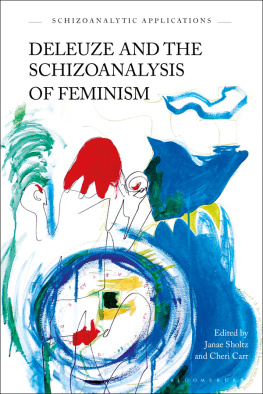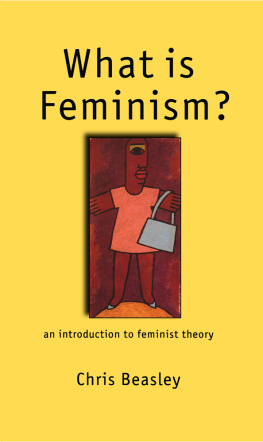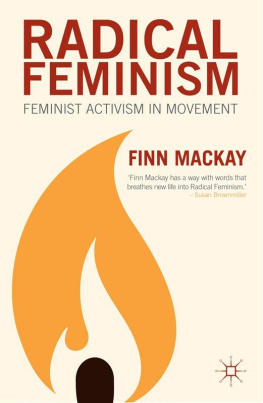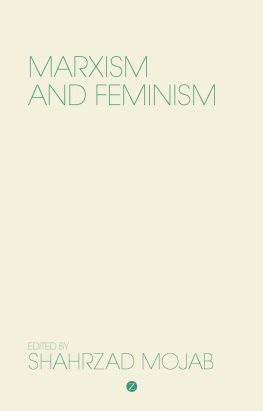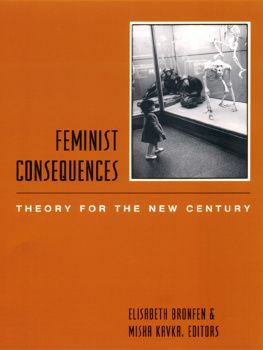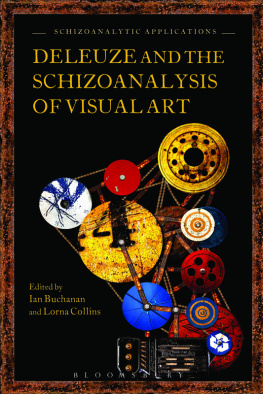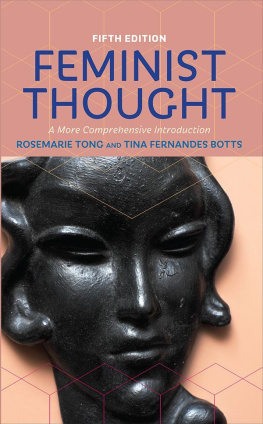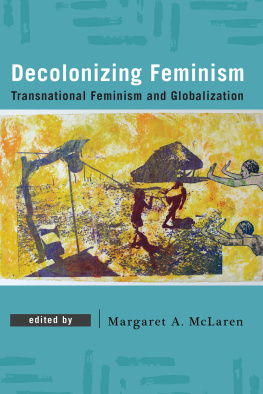
DELEUZE AND THE SCHIZOANALYSIS OF FEMINISM
DELEUZE AND THE SCHIZOANALYSIS OF FEMINISM
ALLIANCES AND ALLIES
Editors
Janae Sholtz
Cheri Lynne Carr

BLOOMSBURY ACADEMIC
Bloomsbury Publishing Plc
50 Bedford Square, London, WC1B 3DP, UK
1385 Broadway, New York, NY 10018, USA
BLOOMSBURY, BLOOMSBURY ACADEMIC and the Diana logo are trademarks of Bloomsbury Publishing Plc
First published in Great Britain 2019
Copyright Janae Sholtz, Cheri Lynne Carr, and contributors 2019
Janae Sholtz and Cheri Lynne Carr have asserted her right under the Copyright, Designs and Patents Act, 1988, to be identified as Editors of this work.
Cover image: Its important to revisit traumas , 2018, mixed media on canvas Jeanne Hamilton
All rights reserved. No part of this publication may be reproduced or transmitted in any form or by any means, electronic or mechanical, including photocopying, recording, or any information storage or retrieval system, without prior permission in writing from the publishers.
Bloomsbury Publishing Plc does not have any control over, or responsibility for, any third-party websites referred to or in this book. All internet addresses given in this book were correct at the time of going to press. The author and publisher regret any inconvenience caused if addresses have changed or sites have ceased to exist, but can accept no responsibility for any such changes.
A catalogue record for this book is available from the British Library.
A catalog record for this book is available from the Library of Congress.
ISBN: HB: 978-1-3500-8041-6
ePDF: 978-1-3500-8042-3
eBook: 978-1-3500-8043-0
Series: Schizoanalytic Applications
To find out more about our authors and books visit www.bloomsbury.com and sign up for our newsletters.
Schizoanalytic Applications
Schizoanalysis has the potential to be to Deleuze and Guattaris work what deconstruction is to Derridasthe standard rubric by which their work is known and, more importantly, applied. Many within the field of Deleuze and Guattari studies would resist this idea, but the goal of this series is to broaden the base of scholars interested in their work. Deleuze and Guattaris ideas are widely known and used but not in a systematic way, and this is both a strength and weakness. It is a strength because it enables people to pick up their work from a wide variety of perspectives, but it is also a weakness because it makes it difficult to say with any clarity what exactly a Deleuzo-Guattarian approach is. This has inhibited the uptake of Deleuze and Guattaris thinking in the more willful disciplines such as history, politics, and even philosophy. Without this methodological core, Deleuze and Guattari studies risk becoming simply another intellectual fashion that will soon be superseded by newer figures. The goal of the Schizoanalytic Applications series is to create a methodological core and build a sustainable model of schizoanalysis that will attract new scholars to the field. With this purpose, the series also aims to be at the forefront of the field by starting a discussion about the nature of Deleuze and Guattaris methodology.
Series editors: Ian Buchanan, David Savat, and Marcelo Svirsky
Other titles in the series:
DELEUZE AND THE SCHIZOANALYSIS OF RELIGION,
edited by Lindsay Powell-Jones and F. LeRon Shults
DELEUZE AND THE SCHIZOANALYSIS OF LITERATURE,
edited by Ian Buchanan, Tim Matts and Aidan Tynan
DELEUZE AND THE SCHIZOANALYSIS OF VISUAL ART,
edited by Ian Buchanan and Lorna Collins
For Lynette and Velita
CONTENTS
Janae Sholtz and Cheri Lynne Carr
Claire Colebrook
Audron ukauskait
Erinn Cunniff Gilson
Tamsin Lorraine
Katja iigoj
Nir Kedem
Hannah Stark and Timothy Laurie
Janae Sholtz
Heidi Samuelson
Amy Chan Kit-Sze
Chrysanthi Nigianni
Celiese Lypka
Fernanda Negrete
Austin Sarfan
Hollie Mackenzie
Cover Image Its important to revisit traumas , 2018, mixed media on canvas, Jeanne Hamilton
Janae Sholtz and Cheri Lynne Carr
This collection explores the myriad ways that Gilles Deleuze and Flix Guattaris schizoanalytic methodology can align with contemporary feminist concerns and practices to generate mutually productive insights for future directions within these fields. The volume creates spaces for positive encounters between Deleuze and feminism that enhance and inform contemporary feminist perspectives and concerns and sharpens the focus of this engagement by specifically considering how Deleuze and Guattaris collaborative project proposed in Anti-Oedipus , developed and transformed through their later, subsequent work together can be an ally to various forms of feminist methodology. Thus, its thematic focus on schizoanalysis constitutes an innovative and unique intervention into the already rich discussions which have transpired over the last decades with regard to feminist responses to Deleuzoguattarian philosophy. Thus, this is a project is about alliancesexploring how the methods, concepts, and practices that evolve out of Deleuze and Guattaris vision for philosophy can be allies to feminist projects of critique, revaluation, and reimagining of the philosophical, ethical, aesthetic, and political fields. The overarching questions we explore are: Between schizoanalysis and feminism, what alliances have been formed or can be imagined? What can schizoanalysis do for feminist theory? What would a feminist schizoanalysis look like, or, rather, what can feminism do for schizoanalysis? We hope to create a space to unleash new ideas, new desires, and new imaginingsa feminist delirium.
As a whole, this collection highlights the strength, richness, and diversity of feminist perspectives and prerogatives. Issues of reconceiving desire, theorizing embodiment and materiality, interrogating the status of sexuality and difference, the project of decentering feminist practice to be inclusive of transnational and de-colonial concerns, critiques of binary logic and gender from materialist or LGBTQA perspectives, intersectional and transversal analyses, posthumanist and ecological concerns, and the need for new political visions in light of advanced capitalism, are all points of connection. The creative intervention that this book offers operates with two guiding assumptions: (1) To forge an alternative alliance between feminism and Deleuze and Guattaris work, we have to locate the particular invocations of sexuality and the feminine within the broader conceptual concerns of their work and recognize that any decontextualized emphasis on certain concepts often eclipses the possibility of engaging their project. Thus, we hope to broaden the engagement of Deleuze and Guattaris corpus through rigorous attention to the scope and breadth of schizoanalysis as a methodology that extends throughout their work. Though the focus may seem to be narrowed in this manner, we actually think that the effect will be the opposite: schizoanalysis represents the theoretical and methodological foregrounding of the concepts like becoming-woman, rhizomatics, and deterritorialization central to A Thousand Plateaus and returns us to the locus of their transformative theory of desire which is at the center of their understanding of both individual subjectivity and social collectivities, ethics and politics. We hope to avoid some of the pitfalls of excising particular problematic concepts from their milieus and, by doing so, look at some of these issues with fresh eyes. (2) Such a focus also provides an opportunity to return to the necessity of critiquing our contemporary social and economic frameworks from both the local and global perspective and to address the motivations and origins of fascistic tendencies that lead to and solidify oppressions, as these are central problematics that schizoanalysis addresses. The aim, then, is to see how schizoanalysis can help address some of the pressing problems and concerns for feminism today. In order to do this, we have striven for diversity of perspectives, thematically and geographically.
Next page
